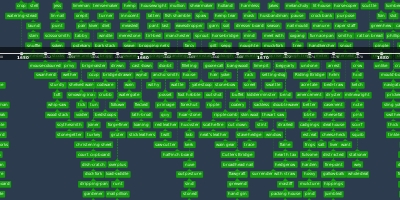1 gen 1668 anni - average
Descrizione:
A regional word of uncertain origin. In 1534 there was a dispute in York about <i>the averege</i> that the common people of the city claimed in Bishopfield from Michaelmas to Lady Day; that is over the winter period (YRS106/169). This was explained by the editor as ‘service done by a tenant with his beasts of burden’, but it seems more likely that it referred to rights of pasturage in the field once the corn had been harvested, possibly from Latin <i>averia</i>; that is cattle. The word was said to be still in everyday use in parts of north Yorkshire in the nineteenth century, and it occurs at regular intervals in documents that had to do with common pasturing rights. In some of these cases the references seem to be to the grass itself. In 1668, for example, Ralph Dewsberry of Acomb was fined 1<i>s</i> 6<i>d for letting his oxen go in the averidge</i> (YRS131/171): in the East Riding village of Lund, in 1734, it was ordered that <i>none shall break the averarge</i> [sic] <i>with cows or gelt cattle till the corn be inn’d</i>, under pain of 2s 6d (YRS69/99). What may be an earlier reference has an unusual spelling: 1482 <i>make thar perambulacon in the averer tym and yf tha found not opyn the gayts of the garth tha wold brek them opyn</i>, York (YRS98/63). Note: 1281 ‘there are small herbages after the corn and hay are carried which are called <i>Averinge</i>’, Cottingham (YRS12/240); 1641 <i>none shall keepe any geese from the third of May until Averish tyme</i>, Burton Agnes (YRS74/93).Aggiunto al nastro di tempo:
Data:
1 gen 1668 anni
Adesso
~ 357 years ago
